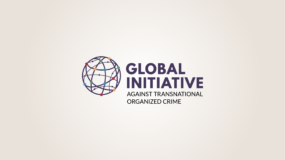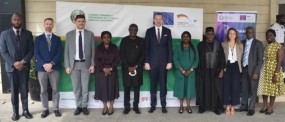The Global Initiative Against Transnational Organized Crime (GI-TOC) is shocked by the Nigerien public prosecution’s decision to demand a jail term in defamation charges pursued against Samira Sabou and Moussa Aksar at the latest hearing held on 27 December, 2021.
The request for a jail term came after Chief Prosecutor, Mr Chaibou Moussa, unequivocally undertook to drop charges against the two journalists during two meetings held with lawyers from the l’Office Central de Répression du Trafic Illicite des Stupéfiants (OCRTIS) and the GI-TOC in Niamey on 15 and 16 December.
In those meetings OCRTIS also undertook to withdraw the complaint that triggered the charges as part of the agreement with the GI-TOC. While OCRTIS did in fact honor its commitment at the 27 December hearing, the public prosecution did not. Instead of following through on its undertaking, the prosecution asked for a jail term. The presiding judge is now expected to deliver a judgment tomorrow 3 January, 2022.
Background
Ms Sabou, investigative journalist and blogger, and Mr Aksar, director of the media site “L’Événement Niger”, on 09 September were charged in court under Niger’s draconian cyber criminality law which provides for imprisonment of up to three years in respect to direct or indirect defamation. The two have been prosecuted following a complaint by OCRTIS, due to their circulation on social media of an article issued by the GI-TOC.
The article in question, ‘Strange Days for Hashish Trafficking in Niger’, was published by the GI-TOC on 11 May 2021 and reported on the trafficking of Lebanese cannabis resin through West Africa to North Africa, and the seizure by Nigerien authorities of a large shipment on 02 March. The GI-TOC reported information from multiple sources concerning the subsequent reacquisition of part of the shipment by traffickers, who later moved the drugs to Libya and Egypt. After the article was published, OCRTIS requested a right of reply, which was posted directly and incorporated into the article by the GI-TOC.
In December, following months of negotiations, the GI-TOC had reached an agreement to cooperate with OCRTIS in joint initiatives to be organized in Niamey, and acknowledged this agreement and the agency’s decision to withdraw its complaint in a statement published on (read statement here).
At no point did the GI-TOC retract or withdraw any of the claims in the article, or indeed the article itself, which is still published on its website. The GI-TOC continues to stand by the full contents of its report, which is based on triangulated source information.
Appeal to the President
The GI-TOC’s article was never meant as an attack Nigerien state, OCRTIS or the Office of the President, a claim which has been used by the prosecution to justify the use of the cybercriminal law. On the contrary, the article offers important visibility on evolving drug trafficking challenges within the Sahel, essential for the advancement of efforts to address trafficking and the harm posed by it to nations and citizens within the sub-region.
The targeting of two prominent Nigerien investigative journalists for merely sharing the GI-TOC’s article on social media is a craven response intended to silence legitimate questioning and debate centered on drug trafficking and its corruptive power. This is not a phenomenon exclusive to Niger, on the contrary, numerous countries targeted by transnational criminal networks have fallen victim to this corruptive power.
However, Niger is one of only a few states that has responded to this challenge by choosing to target human rights defenders, journalists and civic activists for their efforts to understand the challenge posed by transnational organized crime and their fight to improve rule of law and anti-corruption practices.
This is not the first time Nigerien authorities resorted to intimidation when faced with reports which they do not like. Multiple Nigerien investigative journalists and researchers have suffered from this, including Ms Sabou and Mr Aksar in previous cases instituted against them. Instead of addressing the core matter raised by the article, by launching an independent investigation, Nigerien authorities are seeking yet again to intimidate, by leveraging the arbitrary powers afforded by the cyber criminality law.
Against this background, the GI-TOC calls on President Mohamed Bazoum to use all legal means at his disposal to end immediately the injustice perpetrated on Samira Sabou and Moussa Aksar.
The GI-TOC will not be intimidated and stands in solidarity with Ms Sabou and Mr Aksar, brave local journalists who face sanction for fulfilling their responsibility to ask difficult questions and sustain important debate. The GI-TOC will vigorously fight by their side.
La GITOC choquée par la réquisition de peine de prison pour Samira Sabou et Moussa Aksar
Appel au Président de mettre fin immédiatement à l’injustice infligée aux journalistes
L’Initiative mondiale contre la criminalité transnationale organisée est choquée par la décision du ministère public nigérien d’exiger une peine de prison dans l’affaire de diffamation engagée par les autorités nigériennes contre Samira Sabou et Moussa Aksar lors de la dernière audience tenue le 27 décembre 2021.
Cette réquisition de peine de prison est intervenue après que le procureur de la République de Niamey M. Chaibou Moussa s’était engagé sans équivoque à abandonner les accusations retenues contre les deux journalistes lors de deux réunions tenues avec des avocats de l’Office central de répression du trafic illicite des stupéfiants (OCRTIS) et de la GI-TOC à Niamey les 15 et 16 décembre.
Lors de ces réunions, l’OCRTIS s’est également engagé à retirer la plainte qui a déclenché les accusations dans le cadre de l’accord avec la GI-TOC. Si l’OCRTIS a effectivement honoré son engagement lors de l’audience du 27 décembre, le ministère public ne l’a pas fait. Au lieu de donner suite à son engagement, le parquet a demandé une peine de prison. Le juge-président devrait maintenant rendre un jugement demain 3 janvier 2022.
Contexte
Mme Sabou, journaliste d’investigation et blogueuse, et M. Aksar, directeur du site médiatique « L’Événement Niger », ont été inculpés devant le tribunal le 09 septembre, en vertu de la loi draconienne sur la cybercriminalité du Niger qui prévoit une peine d’emprisonnement pouvant aller jusqu’à trois ans pour diffamation directe ou indirecte. Les deux journalistes ont été poursuivis à la suite d’une plainte de l’OCRTIS, en raison de la diffusion sur les réseaux sociaux d’un article publié par la Global Initiative Against Transnational Organized Crime (GI-TOC).
L’article en question, « Strange Days for Hashish Trafficking in Niger » (en français : « Des jours étranges pour le trafic de haschich au Niger »), a été publié le 11 mai 2021 et fait état du trafic de résine de cannabis libanaise à travers l’Afrique de l’Ouest vers l’Afrique du Nord, et la saisie par les autorités nigériennes d’une importante cargaison le 02 Mars. La GI-TOC a rapporté des informations provenant de sources multiples concernant la réacquisition ultérieure d’une partie de la cargaison par des trafiquants, qui ont ensuite transporté la drogue vers la Libye et l’Égypte. Après la publication de l’article, l’OCRTIS a demandé un droit de réponse, qui a été à la fois posté directement et intégré à l’article par le GI-TOC.
Après des mois de négociations, la GI-TOC était parvenu à un accord pour coopérer avec l’OCRTIS dans le cadre d’initiatives conjointes à organiser à Niamey et a pris acte de cet accord et de la décision de l’agence de retirer sa plainte dans un communiqué (lire le communiqué ici).
À aucun moment, la GI-TOC n’a rétracté ou retiré le contenu de l’article, ni l’article lui-même, qui est toujours publié sur son site Web (voir l’article ici). La GI-TOC continue de s’en tenir à l’intégralité du contenu de son rapport, qui est basé sur des informations de sources triangulées.
Appel au Président
L’intention de l’article de la GI-TOC n’a jamais été conçue comme une attaque contre l’État nigérien, l’OCRTIS ou le bureau du président, une allégation qui a été utilisée par le ministère public pour justifier l’utilisation de la loi sur la cybercriminalité. Au contraire, l’article offre une visibilité importante sur l’évolution des défis du trafic de drogue au Sahel, essentiel pour l’avancement des efforts visant à lutter contre le trafic et les dommages qu’il pose aux nations et aux citoyens de la sous-région.
Le ciblage de deux éminents journalistes d’investigation nigériens pour le simple fait de partager l’article de la GI-TOC sur les réseaux sociaux est une réponse lâche destinée à faire taire les questions et débats légitimes centrés sur le trafic de drogue et son pouvoir de corruption. Il ne s’agit pas d’un phénomène exclusif au Niger, au contraire, de nombreux pays ciblés par des réseaux criminels transnationaux ont été victimes de ce pouvoir corrupteur.
Cependant, le Niger est l’un des rares États à avoir répondu à ce défi en choisissant de cibler les défenseurs des droits humains, les journalistes et les militants civiques en raison de leurs efforts pour comprendre le défi posé par le crime organisé transnational et leur lutte pour améliorer l’état de droit et la lutte contre les pratiques de corruption.
Ce n’est pas la première fois que les autorités nigériennes ont eu recours à l’intimidation face à des informations qui ne leur plaisent pas. De nombreux journalistes d’investigation et chercheurs nigériens en ont souffert, dont Mme Sabou et M. Aksar, lors de précédents procès intentés contre eux. Au lieu d’aborder la question centrale soulevée par l’article, en lançant une enquête indépendante, les autorités nigériennes cherchent une fois de plus à intimider en tirant parti des pouvoirs arbitraires conférés par la loi sur la cybercriminalité.
Dans ce contexte, la GI-TOC en appelle au président Mohamed Bazoum afin qu’il utilise tous les moyens légaux à sa disposition pour mettre fin immédiatement à l’injustice perpétrée contre Samira Sabou et Moussa Aksar.
La GI-TOC ne se laissera pas intimider par les derniers développements judiciaires de cette affaire et réaffirme sa solidarité envers Samira Sabou et Moussa Aksar, de courageaux journalistes qui encourent des sanctions pour avoir rempli leur responsabilité de poser des questions difficiles et de soutenir un débat important. La GI-TOC se tiendra toujours fermement à côté d’eux dans ce combat.



